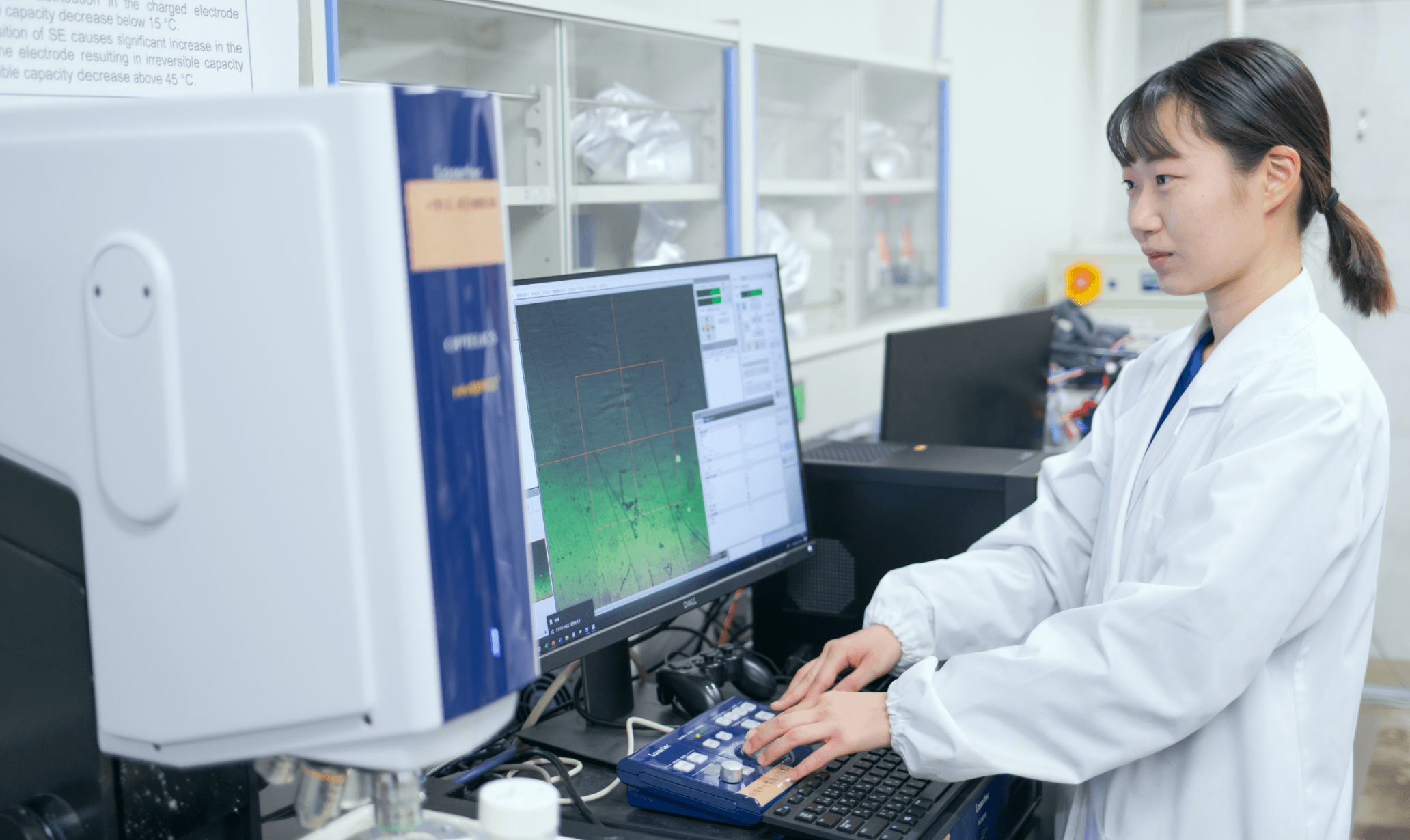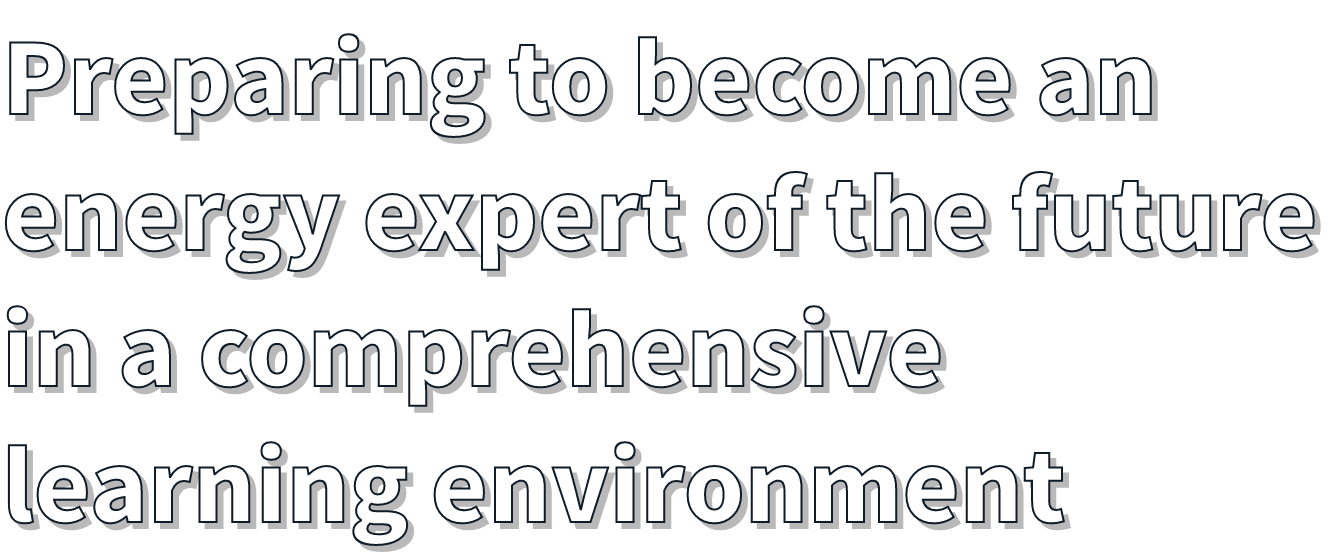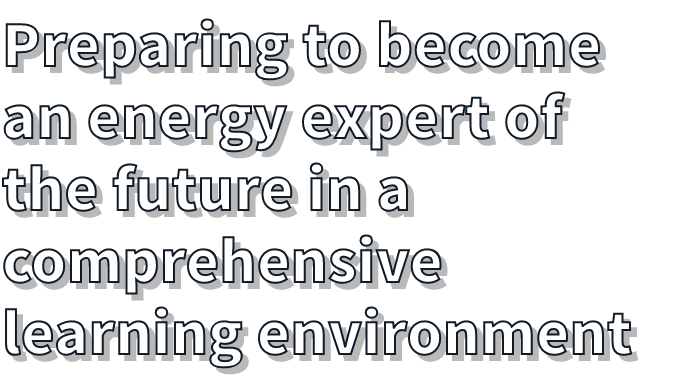

School of Materials and Chemical Technology
Department of Chemical Science and Engineering
Graduate Major in Energy Science and Informatics
Nanako Nonaka
The ideal laboratory discovered through the Internet:
An outstanding program that integrates both master’s and doctoral studies
I have always been very fond of chemistry, and as an undergraduate student I studied semiconductor materials at a university in Saitama. As I deepened my knowledge of science and technology, I gradually came to realize the importance of efficient energy use and became interested in the development of storage batteries, which made me consider pursuing graduate research on batteries that can efficiently store and utilize renewable energy. After researching various university laboratories online and attending information sessions at several universities, I was most attracted to the laboratory of Professor Hajime Arai at Science Tokyo, where I am currently enrolled.
When it comes to research on batteries, the main focus is often on the development of new materials. However, the Arai Laboratory places emphasis on first gaining a solid understanding of the mechanism of the battery itself, and then moving on to improving performance and developing new materials as the next step. This approach really resonated with me, and made me want to research storage batteries here for my master’s.
As I continued to research the master’s program at this university, I came across the website of the Academy of Energy and Informatics, where I learned that Institute of Science Tokyo offers an integrated master’s and doctoral program that would support me both academically and financially to become an expert in energy. This ultimately became the deciding factor in my decision to enroll in the doctoral program at the academy.


Study abroad in China through a joint graduate program
In April 2022, I entered the master’s program at Institute of Science Tokyo, majoring in Energy Science and Engineering at the School of Materials and Chemical Technology. Hoping to conduct research in China, where there is active research into automotive batteries, I applied to a joint graduate program with Tsinghua University in Beijing and started preparing for studying abroad, including practicing for interviews and learning Chinese. Then, in the following September, I entered the master’s program at Tsinghua University (School of Materials Science and Engineering).
Due to the COVID-19 pandemic at the time, the first month of my studies was conducted online, but I was able to attend in-person classes from October. I conducted research on storage batteries in China for about a year, until October 2023. After returning to Japan, I enrolled in the Academy of Energy and Informatics in April 2024, where I am currently pursuing my doctorate in Energy Science and Informatics and continuing my studies and research within the Academy.
Daily research dedicated to the practical application of next-generation batteries


At the School of Materials and Chemical Technology, I am currently conducting research on the subject of in-situ optical observation of the reaction field of bifunctional air electrodes.
Currently, there is a growing movement toward utilizing renewable energy to build a sustainable society. However, it’s important to remember that we are dealing with nature. Solar power, for example, can only generate electricity during the day, which makes energy storage technology, such as batteries to store daytime electricity for nighttime use, extremely important.
The most famous type of battery is the lithium-ion battery, which is used in smartphones. However, since it is made of flammable materials, the larger the battery, the greater the risk of fire or explosion. Moreover, lithium is an expensive material. If we are to operate long-term storage batteries in large-scale applications such as electric vehicles, for example, it is essential to develop batteries that are cheaper and safer than lithium. One promising candidate for the next generation of batteries is the “air secondary battery,” but there are still areas that need improvement, so it has not yet been put to practical use. As one of the measures to improve this, I am focusing my research on reducing the losses that occur during charge and discharge at the positive electrode (bifunctional air electrode) in air secondary batteries, in order to improve energy conversion efficiency.
Adding value to one’s own background
through diverse interactions and extra learning
The Academy of Energy and Informatics does not conduct research itself. Instead, it provides additional learning opportunities based on the research students carry out at the school, department, or graduate major to which they belong. I myself participate in a variety of classes and events, and through exchanges and discussions with other students from the academy, industry professionals, and professors from universities abroad, I am developing my multi-scope and international collaboration skills on a daily basis.
In my master’s program, I took courses in energy science, big data science, and social design. In each course, I acquired systematic and broad knowledge in energy devices and systems, basic knowledge and skills in big data science, and knowledge of the applied aspects of social implementation using artificial intelligence and data science technologies, as well as knowledge and skills necessary to compete in social science fields such as economics and policy theory. Through my studies at the academy, I have gained a broader and more multifaceted insight into the position of my research in society, and I have a strong sense of my own growth.
In the doctoral program, I am taking the InfoSyEnergy practice courses. Through discussions with international mentors and students from a wide range of research fields at international forums and various workshops, I hope to develop a multifaceted perspective and a global network of people, while also honing my communication and discussion skills.


I participated in the international forum for the first time last November and December (2024). The content of the forum varies every year, but last year’s program involved spending about a week at one of eight affiliated research facilities overseas. I visited a laboratory at Princeton University near New York, where I observed research on rocket fuel combustion technology. It was a valuable experience to exchange opinions with students in the laboratory and observe actual experiments, seeing firsthand the research environment and student life at a university overseas. After returning to Japan in December, students from the academy and international mentors gathered at Ookayama Campus to discuss research topics that could be generated from our respective research fields, allowing us to acquire a multifaceted, interdisciplinary perspective.
Energy is a broad term that covers a wide range of fields. By interacting with students outside of your own field, you can broaden your research horizons and see things from multiple perspectives. Drawing on my background in both semiconductors and batteries, I hope to become a researcher with a well-rounded, interdisciplinary perspective.
Financial support and corporate mentoring:
Supporting students’ studies and career paths behind the scenes


Receiving financial support is also incredibly appreciated. For example, participants in the aforementioned international forum have all their travel expenses fully covered. In particular, the monthly stipend is also a significant source of support for doctoral students, who are often too busy with research to do part-time jobs. This funding allows us to concentrate on our studies without financial worry.
Another thing I am extremely grateful for is the presence of corporate mentors. Once a year, a person from a company is assigned as a mentor, providing an opportunity for a one-on-one meeting. I had the opportunity to consult with my mentor for about an hour last December.
At the time, I had just started my doctoral program and was uncertain about my future, with no clear vision of where I was headed. During that period of anxiety, my mentor told me: “A doctorate isn’t just about mastering research. There are many opportunities, such as managing a laboratory or presenting research at academic conferences, so you don’t necessarily have to limit yourself to research.” This advice brightened my outlook in one fell swoop.
In fact, this person had earned a doctorate and was working in a management role supporting research within a company, so I found his words very persuasive. I realized that there are many ways to work other than just focusing on research, and this opened up a whole new range of options for me, which has ultimately been a great source of motivation for my daily research activities.
Achieving a clear vision of my future through diverse learning and experiences
The Academy of Energy and Informatics offers a wide range of learning opportunities and financial support, providing an ideal environment where the more motivated you are, the more you feel your own growth. Your world will surely expand through new encounters, learning, and experiences that you wouldn’t be able to gain through research alone in your current school, department, or graduate major.
I would also recommend the academy to those who haven’t yet connected what they want to do with a clear career path. I myself love chemistry, and I entered the doctoral program with a desire to develop batteries that would contribute to a sustainable society. To be honest, however, I didn’t really have a clear vision for what lay beyond that. As I participated in events and interacted with various people at the academy, I came to realize that my future options are definitely expanding.
Of course, you will have to make preparations to participate in events and take more classes than other students, but if you are ambitious, I think you will see that overcoming these difficulties will ultimately contribute to shaping your future. I believe that this is an excellent learning opportunity for those who want to expand their possibilities and discover better ways to make use of their skills.
School of Materials and Chemical Technology
Department of Chemical Science and Engineering
Graduate Major in Energy Science and Informatics
Nanako Nonaka

School of Materials and Chemical Technology
Department of Chemical Science and Engineering
Graduate Major in Energy Science and Informatics
Nanako Nonaka
- April, 2022
- Enrolled in the Graduate Major in Energy and Informatics in the Department of Chemical Science and Engineering, School of Materials and Chemical Technology at Institute of Science Tokyo.
- September, 2022
- Enrolled in the Master’s degree program at Tsinghua University
(Science Tokyo-Tsinghua University Joint Graduate Program Nanotechnology Course) - January, 2024
- Completed the Master’s degree program in the Department of Material Science and Engineering at Tsinghua University
- April, 2024
- Registered in the Academy of Energy and Informatics
- September, 2024
- Completed the Graduate Major in Energy and Informatics in the Department of Chemical Science and Engineering, School of Materials and Chemical Technology at Institute of Science Tokyo
- October, 2024
- Enrolled in the Doctoral Degree Program in Energy and Informatics in the Department of Chemical Science and Engineering, School of Materials and Chemical Technology at Institute of Science Tokyo
(As of February 2025)




